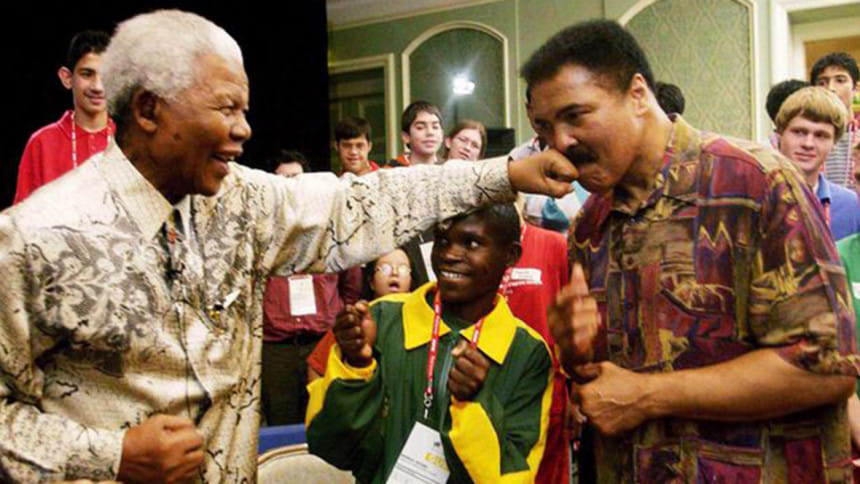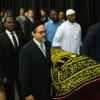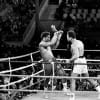Ali and the power of dissent

"Silence becomes cowardice when occasion demands speaking out the whole truth and acting accordingly." --Mahatma Gandhi
On April 28, 1967, Muhammad Ali, just 25 years of age, stood at the Houston Military Recruiting Office and said he won't go to Vietnam. "I ain't got no quarrel with the Vietcong, no Vietcong ever called me nigger," he said and defiantly courted arrest.
Ali was neither a politician, nor an ideologue in search of an identity. He was just a boxer, who wanted the world to know he did not support the American invasion of Vietnam. With that single act, Ali instantly joined the ranks of the greatest dissenters of history, firmly drawing a line delineating himself from the many millions of his countrymen who preferred to simply obey an order from their government. He refused to be silent and to speak out the whole truth.
"I ain't got no quarrel with the Vietcong, no Vietcong ever called me nigger," he said.
The act of courage demonstrated by Ali becomes clear only when we realize what was at stake for him. Under the 1948 Selective Services Act, every able-bodied American, ages 18 to 26, was required to serve at least 21 months of active duty in the US military. Even though the law demanded this of every American, there were many loopholes that allowed the rich and powerful to dodge the draft without facing any retribution. George W Bush and Dick Cheney, future President and Vice President, were draft dodgers, as was Bill Clinton, another future President. Instead of dodging the draft, Ali chose to register his protest.
It was no whim of the moment. He was drafted to serve in 1966 and formally called up for induction in 1967. He had plenty of time to go over the consequences of his action. Many of his friends advised him against taking such a stance. Just a month before he was set to appear before the military board, Ali explained in the strongest possible term why he was opposing the draft. Serving an unjust war was against his faith and against the sense of duty, he said.
"I ain't got no quarrel with the Vietcong, no Vietcong ever called me nigger," he said.
Remember, it was a time when Ali was at his peak. He was already the world champion, having defeated Sony Liston twice. In 1966, he fought five world class prize fighters, beating them all, mostly by knockouts. The world was taking note of a new champion and he was just beginning to see big money flowing in. By refusing to serve, he was throwing away everything; money, fame and power.
As was predicted, two months later, on 20 June 1967, Ali was convicted for refusing to be drafted and was sentenced to five years in prison. More importantly, he was banned from professional boxing for three years. Although he did not actually go to prison as he challenged the ban using every legal tool at his disposal, he lost four prime years, many titles and loads of money.
Why did Ali take such a leap of faith when he knew everything was on the line? This is how he explained a month before the army induction:
"Why should they ask me to put on a uniform and go 10,000 miles from home and drop bombs and bullets on Brown people in Vietnam while so-called Negro people in Louisville are treated like dogs and denied simple human rights? No I'm not going 10,000 miles from home to help murder and burn another poor nation simply to continue the domination of white slave masters of the darker people the world over. This is the day when such evils must come to an end. I have been warned that to take such a stand would cost me millions of dollars. But I have said it once and I will say it again. The real enemy of my people is here.
I have nothing to lose by standing up for my beliefs. So I'll go to jail, so what? We've been in jail for 400 years."
The refusal to serve in Vietnam happened at a time when the war was still popular with most Americans. A whopping 59 per cent thought the war was necessary to protect US interest. By going against the tide, overnight Ali became the target of public derision. A popular hero turned into a pariah.
With his refusal to serve, Ali did two things: he told the world the war in Vietnam was unjust, but more importantly, he demonstrated how a single man's dissent could be a powerful tool to fight against oppression. Ali's act of defiance gave the anti-war movement an adrenaline shot, rallying hundreds of thousands of young people in college campuses across the US. Conscientious objection to war became a growing movement, forcing politicians to think of ways to stop the war.
Ali's rejection of US racism – "The real enemy of my people is here" – was also a huge boost to the growing civil rights movement. Dr. Martin Luther King Jr was already the voice of the movement and he too was viewed by many in the US as a traitor. With Ali taking up the mantle of resistance, he found in him a co-fighter, whose appeal crossed colour boundaries. Dr. King would later recall the inspiration he got from Ali and his action.
Ali's act of heroism also reached far off lands, including South Africa where Nelson Mandela was leading the black people's fight against the white supremacists and their policy of racial segregation. Mandela, who spent 27 years behind bars, said he drew inspiration from Ali and his action. Ali gave me the hope that one day these walls would come down crumbling, he said.
Every change, big and small, begins with dissent. Today, with the death of Ali, the world is celebrating the life of a great champion, whose greatest act of courage involved throwing no boxing punches. He showed the world the power of dissent and how a simple, non-violent act of defiance could bring about change - real change.
June 7, 2016
New York

 For all latest news, follow The Daily Star's Google News channel.
For all latest news, follow The Daily Star's Google News channel. 








Comments